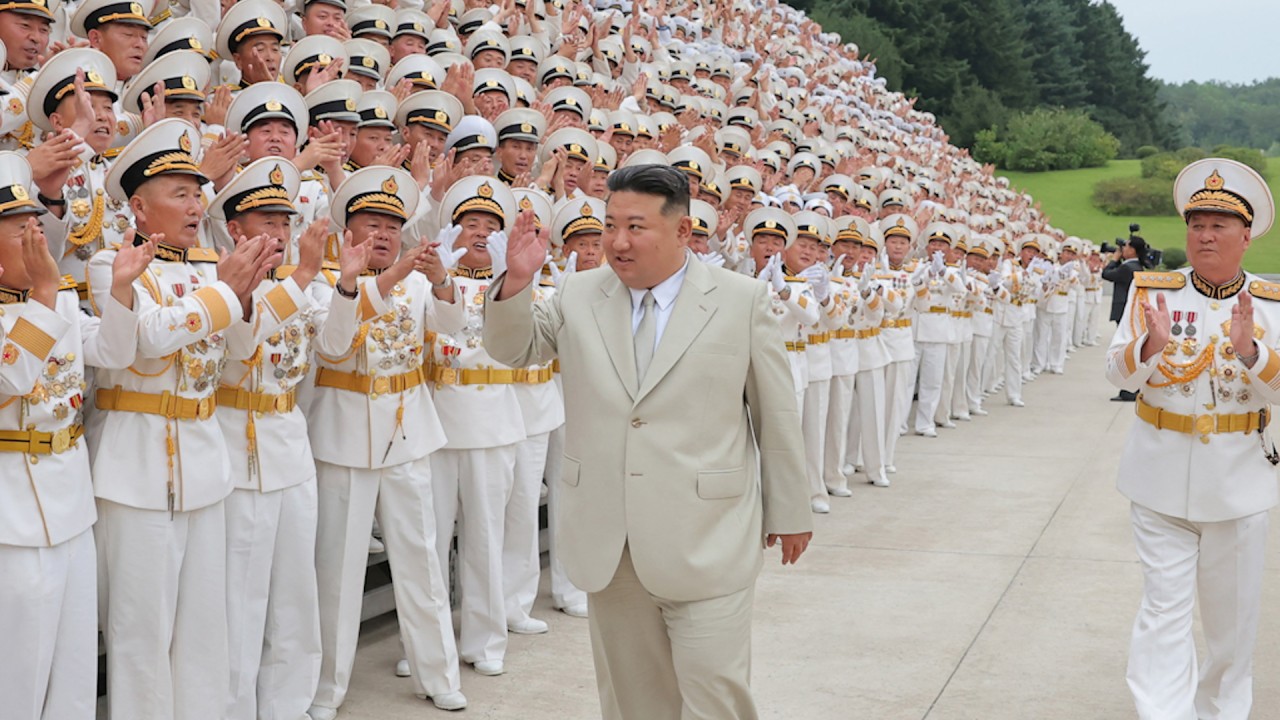
Beijing’s ‘burden’: why North Korea-Russia military ties could become a headache for China
- Washington and regional allies will only strengthen resolve after Pyongyang’s launch of a tactical ‘submarine based on anxiety’, experts say
- North Korea’s Kim Jong-un is visiting Russia this week after Beijing appeared to downplay relations with Pyongyang
Sabre-rattling by North Korea will stiffen Washington’s resolve to forge closer security alliances with Seoul and Tokyo, and become a further “burden”for Beijing, analysts said.
Pyongyang is reportedly planning to sell weapons to Russia, and has recently tested ballistic missiles and launched what it called the country’s first operational “tactical nuclear attack submarine”.
Submarine No 841 – named “Hero Kim Kun-ok” – was launched last Wednesday in an event presided over by North Korean leader Kim Jong-un, according to the state news agency Korea Central News Agency (KCNA).
The submarine, which can carry as many as 10 ballistic missiles, will become one of the country’s “core underwater offensive means of the naval force”, Kim said during the ceremony.
“The Party Central Committee decided to make greater leaps forward in the country’s shipbuilding industry to guarantee a new high point in the strengthened naval force,” Kim said.
The ceremony came ahead of the meeting between Kim and Russian President Vladimir Putin at the Vostochny Cosmodrome in Amur Oblast in the Russian far east. The visit is Kim’s first trip outside North Korea since April 2019.
According to Russian news agencies, Putin said they would discuss helping Pyongyang build its own satellites, stressing the reason behind the pair’s visit to the spaceport.
On Saturday, Kim inspected Russia’s nuclear-capable bombers, hypersonic missiles and an advanced warship from its Pacific fleet.
South Korea’s spy agency, the National Intelligence Service, said Russian Defence Minister Sergei Shoigu had suggested joint military exercises between North Korea, China and Russia when he met the North Korean leader during a visit to Pyongyang in July.
“Why not? These are our neighbours,” Shoigu replied when asked about joint drills with North Korea. “There’s an old Russian saying: you do not choose your neighbours, and it’s better to live with your neighbours in peace and harmony.”
South Korea’s Joint Chiefs of Staff played down the launch of the North’s submarine, saying it was more about fanfare than real threats.
They saud Pyongyang’s claims showed signs of “deception and exaggeration”. An analysis of the external features of the vessel suggested that parts of it had been modified to carry a missile, which was “not consistent with normal operations of such capabilities”.
It seems to be a cosmetic show-off of its submarine based on anxiety
Park Won-gon, a professor of North Korean studies at Ewha Womans University in Seoul, said the vessel appeared to be a Soviet 1,800-tonne Romeo-class submarine, which North Korea acquired from China in the 1970s, adding that the 10 modified launch tube hatches were an “unprecedented” design, raising doubts they were operational.
“[The nuclear submarine] was Kim Jong-un’s priority order … It seems to be a cosmetic show-off of its submarine based on anxiety,” Park said.
“There is no 1,800-tonne class submarine that can carry 10 missiles. Every other submarine that they have, like the Sinpo class, is 2,200 tonnes, and it has only one vertical launching system.”
“China will be in various states of discomfort if North Korea has a nuclear submarine … it justifies US intentions to send its SSBN [ballistic missile submarines] to counter North Korea. US SSBNs in the East Sea and the Korean peninsula will be a burden to China,” Park said, referring to waters also known as the Sea of Japan.
“China may attempt to strengthen its military drills, possibly by holding joint exercises with Russia, to respond [to the US strategic assets].”
In July, the USS Kentucky, an Ohio-class ballistic missile submarine, made a port call to the South Korean city of Busan. And last month, the US deployed B-1B bombers for joint drills with South Korea and Japan.
Park said Beijing might not want to see closer military cooperation between Moscow and Pyongyang.
“Beijing views North Korea-Russia [military ties] as burdensome. Pyongyang and Moscow are meeting because of the war in Ukraine, while China has declared itself as a non-intervener and bystander,” Park said.
“[China] may get caught up with North Korea and Russia cooperating in the war [in Ukraine], increasing the chances of turning Nato and their allies into its enemy,” he said.
Kang Jun-young, a professor of Chinese studies at Hankuk University of Foreign Studies in Seoul, agreed that Beijing may not like the idea of Pyongyang standing shoulder to shoulder with Moscow.
North Korea appears to have chosen Russia over China, which is reluctant to cooperate militarily at this point
“North Korea wants to diversify its nuclear power projection [capability]. The recent emphasis on the role of the navy also means projecting nuclear power in a variety of ways, regardless of the type of military,” Kang said.
“North Korea appears to have chosen Russia over China, which is reluctant to cooperate militarily at this point … North Korea may be taking an approach aimed at gaining intermediary interests between China and Russia.”
But compared with the last Chinese delegation sent before the Covid-19 pandemic in 2018, headed by Li Zhanshu, then the third-ranking official in the Politburo, China appears to have sent lower ranking leaders as representatives to North Korea recently, fuelling speculation that it plans to downplay relations with Pyongyang.
Choo Jae-woo, a professor of Chinese studies at Kyung Hee University in Seoul, said China’s recent economic slowdown had encouraged Beijing to stabilise ties with Washington, which prompted it to downgrade cooperation with Pyongyang.



